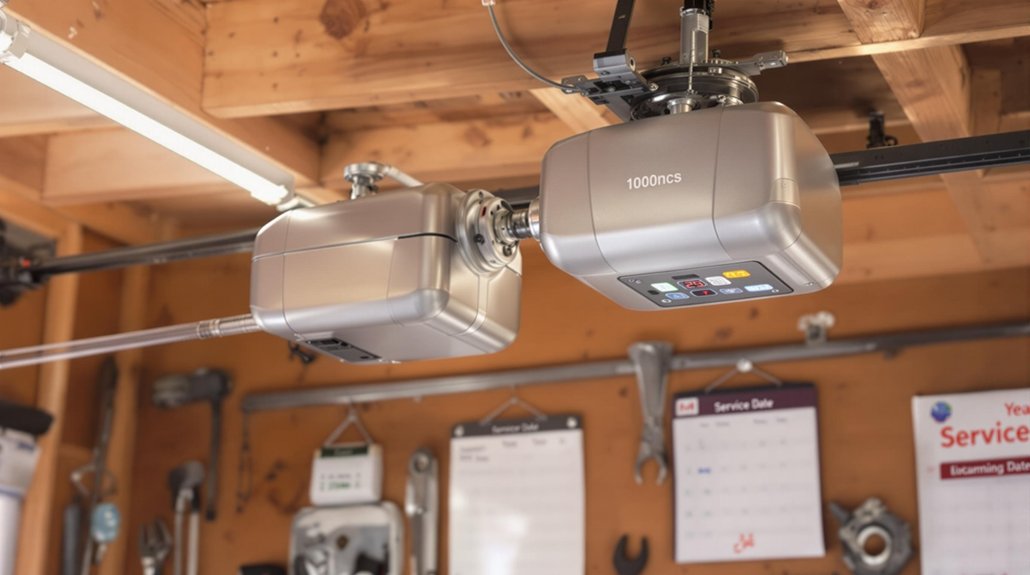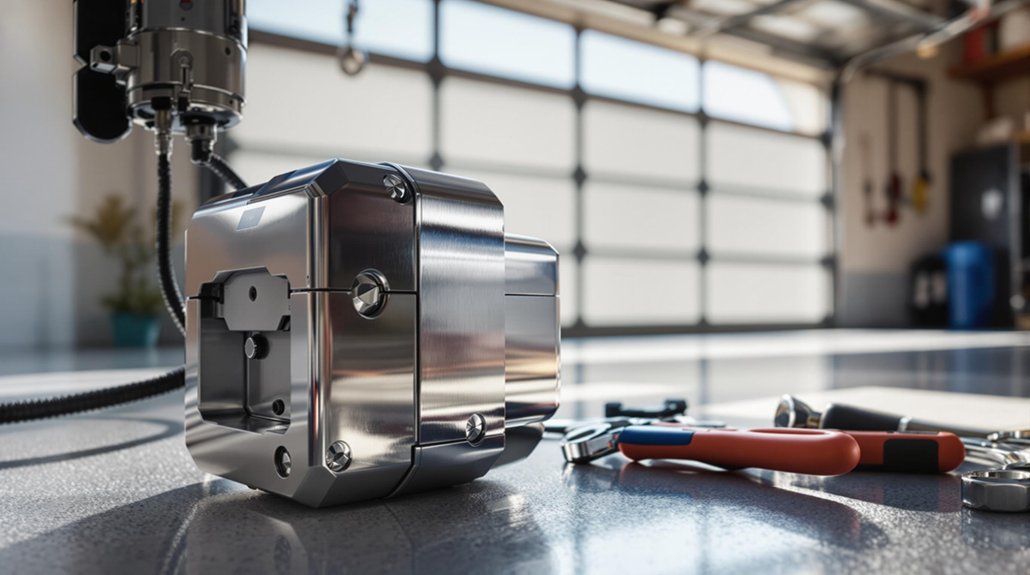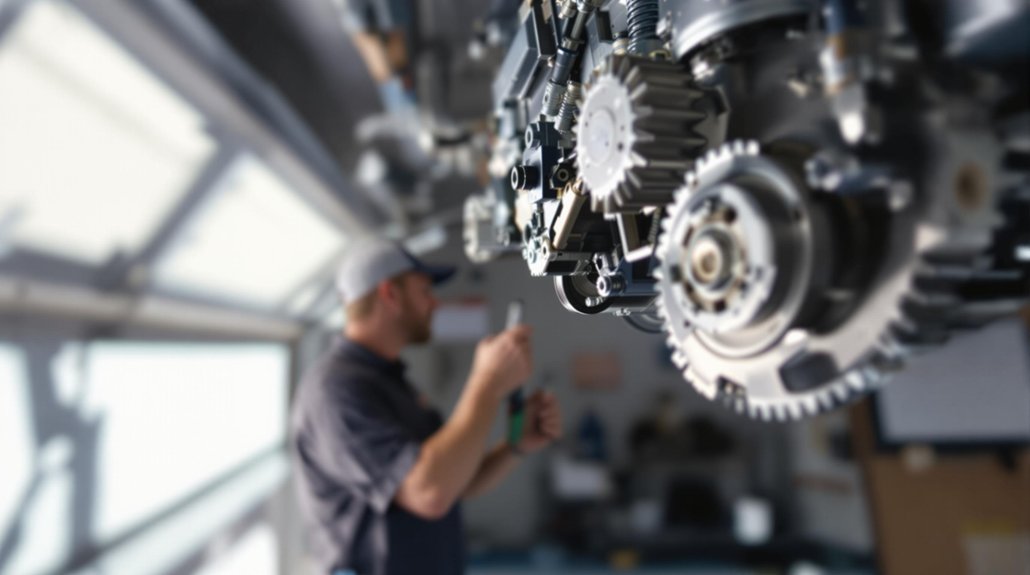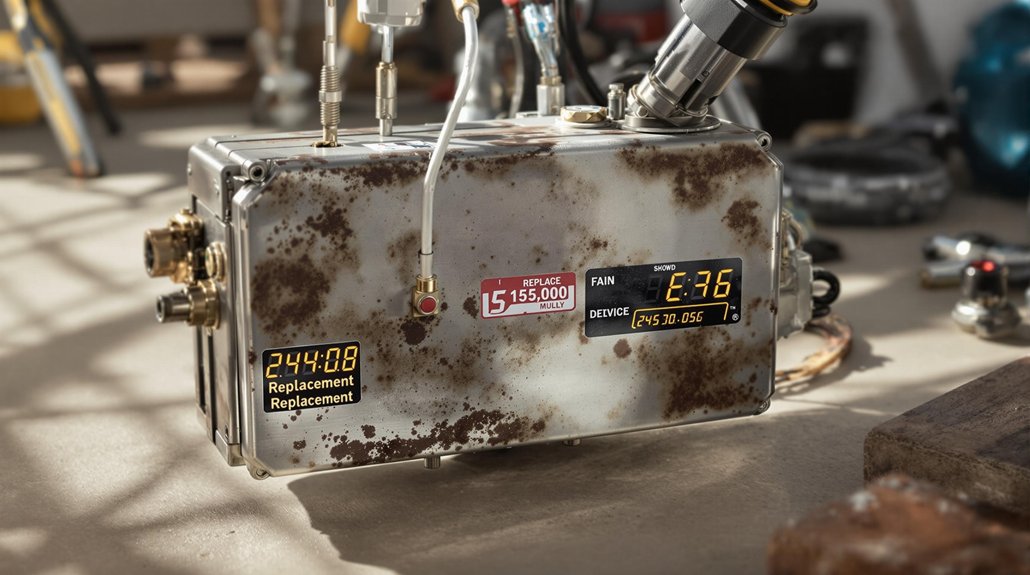Garage door operators generally last between 10 to 15 years. Their lifespan depends on several factors, including usage, installation quality, and maintenance. Operators that are used frequently may wear out quicker, while regular upkeep can extend their life. Environmental conditions, such as extreme temperatures and humidity, also play a significant role in their durability. Additionally, the type of operator matters; chain drive models tend to require more maintenance than belt drive operators. Understanding these factors can help you make informed decisions on replacements and maintenance. Learning more about these aspects can prepare you for future needs.
Key Article Highlights
- Garage door operators typically last between 10 to 15 years, depending on usage and maintenance.
- Regular maintenance and inspections significantly contribute to extending the lifespan of operators.
- Environmental factors like temperature extremes and humidity can impact the durability of garage door operators.
- Poor installation quality may lead to premature failure of garage door operators.
- Modern operators with advanced features often provide better performance and longevity compared to older models.
Average Lifespan of Operators
Understanding the average lifespan of garage door operators is vital for homeowners seeking to maintain their systems effectively. Typically, garage door operators last between 10 to 15 years, depending on various factors such as usage, operator technology, and maintenance. The frequency of use plays a considerable role in determining lifespan; operators that are used multiple times daily may require replacement sooner than those used less frequently.
Operator technology has evolved considerably over the years, resulting in more durable and efficient systems. Modern operators often come equipped with features that enhance their longevity, such as soft-start and soft-stop mechanisms, which reduce wear and tear on the motor. However, even with advanced technology, regular maintenance remains vital. Homeowners should routinely inspect the operator and its components for signs of wear, confirming that any necessary adjustments or repairs are made promptly.
When considering replacement frequency, it is advisable to consult a professional if the operator shows signs of malfunction or if it approaches the end of its expected lifespan. Proactive measures can help avoid unexpected failures and confirm the continued smooth operation of the garage door system.
Types of Garage Door Operators
Garage door operators come in different types, each with unique features. Two common types are chain drive operators and belt drive operators. Understanding the differences between these options can help you choose the right one for your needs.
Chain Drive Operators
Chain drive operators are a popular choice for homeowners seeking reliable and cost-effective garage door systems. These operators utilize a metal chain to lift and lower the garage door, providing sturdy performance. However, regular chain maintenance is essential to guarantee peak drive efficiency and longevity.
| Feature | Advantages | Disadvantages |
|---|---|---|
| Cost | Generally affordable | May require more upkeep |
| Durability | Strong and long-lasting | Can be noisy |
| Installation | Straightforward installation | Heavier than other types |
Proper lubrication and periodic inspections can help extend the life of the chain drive operator. Homeowners should check for wear and tear, and adjust tension as necessary. While chain drive operators may produce more noise compared to other types, their robust construction often compensates for this drawback. By adhering to maintenance recommendations, homeowners can guarantee that their garage door operators function smoothly over time. Ultimately, chain drive operators remain a dependable choice for those looking to balance performance with affordability.
Belt Drive Operators
Another popular option for homeowners is the belt drive operator, which offers a different set of features compared to chain drive systems. Belt drive operators use a rubber belt instead of a metal chain, providing several advantages. One of the main belt drive advantages is their quiet operation. The rubber belt absorbs sound, making them ideal for homes with bedrooms near the garage. Additionally, they typically require less maintenance than chain drives, as there are fewer moving parts that can wear out.
However, belt drive operators also come with some belt drive disadvantages. They can be more expensive upfront than chain drive systems. This higher cost may deter some homeowners, especially those on a budget. Moreover, while they are durable, extreme temperature fluctuations can affect the rubber belt's performance over time.
Key Factors Affecting Longevity

Although many homeowners expect their garage door operators to last for years, several key factors can greatly influence their longevity. One primary factor is usage frequency. Operators that are opened and closed multiple times a day will experience more wear and tear than those used less frequently. This constant operation can lead to quicker degradation of components, ultimately shortening the operator's lifespan.
Another significant factor is installation quality. A poorly installed garage door operator can face undue stress, leading to premature failures. Proper alignment and secure mounting are essential for peak performance. If the operator is not installed correctly, it may strain the motor and other parts, resulting in decreased efficiency and durability.
Additionally, regular maintenance plays an important role in ensuring longevity. Routine inspections and timely repairs can address minor issues before they escalate. Homeowners should also consider environmental factors, such as exposure to weather elements, which can affect the operator's condition over time.
Signs Your Operator Needs Replacement
Recognizing the signs that your garage door operator needs replacement is essential to maintaining home security and convenience. One of the first indicators is increased operator noise. If the unit produces unusual sounds such as grinding, rattling, or excessive humming, this may signal internal wear or mechanical issues that require attention.
Another critical sign is a malfunctioning safety feature. Modern garage door operators are equipped with safety sensors designed to prevent accidents. If the door does not reverse when it encounters an obstruction, or if the sensors fail to detect an object, it poses a severe safety risk. This malfunction can result from aging components or misalignment, indicating the need for replacement.
Additionally, if your operator frequently stops mid-cycle or fails to respond to remote commands, these performance issues suggest that the unit is nearing the end of its service life. A reliable operator should function smoothly and consistently. If you observe any of these signs, it is prudent to consult a professional for an evaluation and consider replacing your garage door operator to guarantee safety and functionality.
Maintenance Tips for Longevity

Assuring the longevity of your garage door operator involves regular maintenance and attention to detail. One of the most important aspects of this maintenance is establishing a preventive maintenance routine. This routine should include periodic inspections to identify any potential issues before they become considerable problems.
Regularly check the alignment of the tracks and verify that the door moves smoothly. Look for any signs of wear on the cables, springs, and rollers. Addressing minor issues early can prevent costly repairs or replacements down the line.
Another critical component of maintenance is adhering to a lubrication schedule. Lubricate the moving parts of the garage door operator, including the hinges, rollers, and tracks, with a suitable lubricant. This will reduce friction, enhance performance, and extend the life of the operator.
Make it a habit to clean the sensors and verify they are free from dust and debris. This will help maintain proper function and safety. By committing to these simple maintenance tips, you can appreciably increase the lifespan of your garage door operator, assuring it operates efficiently for years to come.
Impact of Weather Conditions
Weather conditions play a significant role in the lifespan of garage door operators. Extreme temperatures can affect their performance, while high humidity can lead to corrosion. Additionally, wind and debris can cause physical damage, further impacting their functionality.
Temperature Extremes Effects
Experiencing temperature extremes can considerably impact the performance and longevity of garage door operators. When subjected to temperature fluctuations, these mechanical systems can face various challenges. Extreme weather can lead to the expansion and contraction of materials, which may cause misalignment or increased wear on components.
Key effects to take into account include:
- Lubrication breakdown: High temperatures can cause lubricants to thin, leading to inadequate protection of moving parts.
- Electrical component strain: Cold weather can affect the efficiency of electrical systems, resulting in slower operation or failure to respond.
- Material fatigue: Repeated exposure to harsh temperatures can weaken metal and plastic parts, ultimately shortening the operator's lifespan.
To maximize the durability of garage door operators, regular maintenance is essential. This includes inspecting and adjusting components, ensuring proper lubrication, and addressing any signs of wear. By being proactive, homeowners can mitigate the adverse effects of temperature extremes, ensuring their garage door operators continue to function effectively for years to come. Understanding these temperature-related impacts is vital for anyone looking to maintain their garage door system.
Humidity and Corrosion Risks
While homeowners often focus on temperature extremes, humidity can also pose significant risks to garage door operators. High levels of humidity can lead to moisture accumulation, which increases the likelihood of corrosion. Corrosion is a destructive process that can weaken metal components, impairing the functionality and lifespan of the garage door operator.
The humidity effects on garage door operators are particularly pronounced in coastal or damp areas. In such environments, metal parts may rust more quickly, leading to operational failures. Regular maintenance is essential to prevent this deterioration. Homeowners should inspect their garage door operators frequently for signs of rust or wear.
Corrosion prevention strategies can help mitigate these risks. Applying protective coatings, such as rust-resistant paint or galvanization, can shield metal components from moisture. Additionally, ensuring proper drainage around the garage area will reduce humidity levels and protect the door operator from excessive moisture exposure.
Wind and Debris Impact
Strong winds and flying debris can have a significant impact on the performance and longevity of garage door operators. The forces of nature challenge the structural integrity of these systems, particularly in areas prone to severe weather. Garage doors must have adequate wind resistance to withstand these conditions, or they risk malfunctioning or sustaining damage.
Debris accumulation is another concern. Leaves, twigs, and other materials can obstruct the door's movement. This not only strains the operator but can also lead to premature wear or failure. Regular maintenance is essential for guaranteeing the door operates smoothly and efficiently.
Consider these factors when evaluating the impact of wind and debris on your garage door operators:
- Wind Resistance: Confirm your garage door is rated for high winds to prevent damage.
- Regular Inspections: Check for signs of wear or damage after storms to maintain functionality.
- Debris Removal: Keep the area around the door clear to prevent obstructions.
Importance of Regular Inspections

Regular inspections of garage door operators are crucial for maintaining their longevity and functionality. By regularly examining these systems, homeowners can identify potential issues before they escalate into costly repairs. The recommended inspection frequency is at least once a year, but more frequent checks are advisable, especially in areas with severe weather or heavy usage.
During inspections, it is important to assess various components, including the motor, springs, and safety features. This thorough evaluation helps guarantee ideal operator performance. Any signs of wear or damage should be addressed promptly to avoid safety hazards and prolong the equipment's lifespan.
In addition to mechanical checks, inspecting the garage door tracks and rollers is essential. Keeping these parts clean and free of debris can considerably enhance the door's operation. Regular lubrication of moving parts also contributes to smooth functioning and reduces wear.
Upgrading Your Garage Door Operator
Consider upgrading your garage door operator to enhance both convenience and security. Modern garage door operators now incorporate smart technology that allows you to control your door remotely. This feature not only adds convenience but also boosts safety. You can monitor your garage door from your smartphone, giving you peace of mind whether you are home or away.
Upgrading offers various benefits, including:
- Improved security: Smart technology can notify you if your garage door is left open or if someone tries to tamper with it.
- Advanced safety features: New models often include sensors that prevent the door from closing on objects or people, reducing the risk of accidents.
- Enhanced convenience: Many operators can be integrated with home automation systems, allowing for seamless operation alongside other smart devices.
Investing in an upgraded garage door operator can appreciably improve your home's security and convenience. With the added features of smart technology and enhanced safety, you can enjoy a more secure and efficient garage experience. Consider making this upgrade to guarantee your garage operates at its best.
Cost Considerations for Replacement

Replacing a garage door operator involves several cost considerations that homeowners should carefully evaluate. The primary factor is the replacement costs associated with the operator itself. Prices can vary considerably based on the brand, features, and installation type. Basic models may start around $200, while high-end options can exceed $600.
In addition to the operator's cost, homeowners must consider installation fees. Hiring a professional for installation can range from $100 to $300, depending on the complexity of the job. If you are skilled in DIY projects, you can save this expense, but make sure you understand the installation process to avoid future issues.
It is also wise to factor in any additional components required for installation, such as new tracks or remotes, which may add to the overall expense. Moreover, when planning your budget, consider potential costs for future maintenance or repairs.
Effective budget planning is essential. By evaluating all aspects of replacement costs, you can make an informed decision that fits your financial situation while guaranteeing your garage door operates smoothly and safely.
Frequently Asked Questions
Can I Install a Garage Door Operator Myself?
Yes, you can perform a DIY installation of a garage door operator. However, consider cost considerations such as tools, materials, and potential repairs if mistakes occur. Assess your skill level before proceeding with the installation.
What Are the Safety Features in Modern Operators?
Modern garage door operators symbolize security, equipped with essential safety features like safety sensors that detect obstructions and emergency release mechanisms for manual operation during power outages, ensuring user safety and reliability in various situations.
How Noisy Are Different Types of Garage Door Operators?
Different types of garage door operators exhibit varying noise levels. Chain-driven models tend to be the loudest, while belt-driven operators are quieter, offering a more peaceful operation. Selecting the right type is essential for noise management.
Will a New Operator Work With My Existing Garage Door?
When considering a new operator, it's crucial to assess compatibility concerns with your existing garage door. Additionally, review installation requirements to guarantee a seamless integration, ultimately enhancing functionality and performance for ideal convenience and safety.
Are Smart Garage Door Operators Worth the Investment?
Smart garage door operators offer significant investment benefits, including enhanced security, convenience, and energy efficiency. By integrating smart technology, users can monitor and control their garage doors remotely, ultimately improving overall home management and safety.
Contents
- Key Article Highlights
- Average Lifespan of Operators
- Types of Garage Door Operators
- Key Factors Affecting Longevity
- Signs Your Operator Needs Replacement
- Maintenance Tips for Longevity
- Impact of Weather Conditions
- Importance of Regular Inspections
- Upgrading Your Garage Door Operator
- Cost Considerations for Replacement
- Frequently Asked Questions
